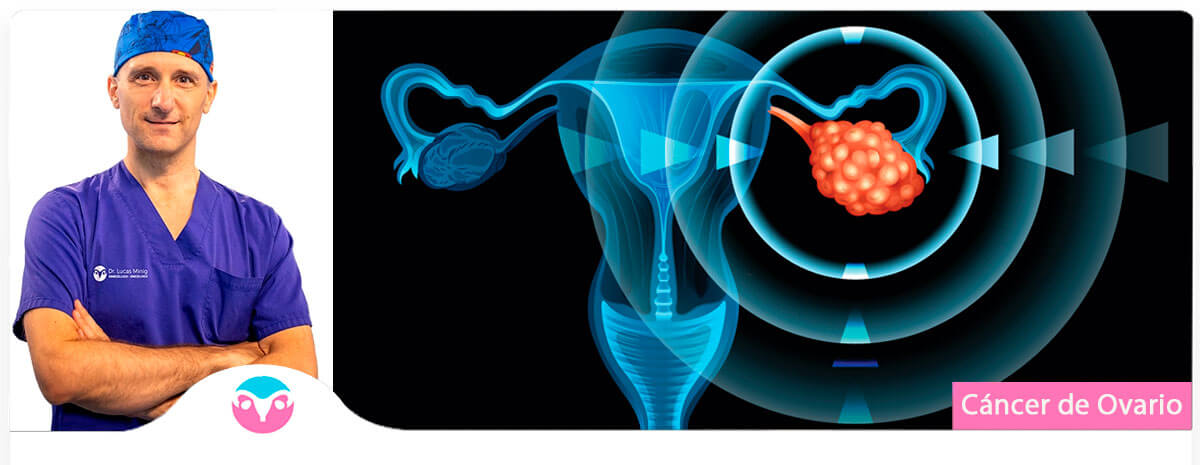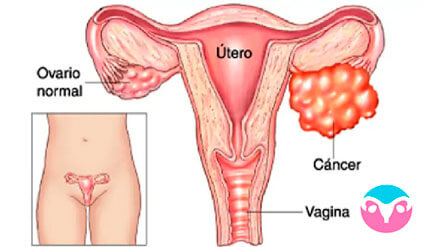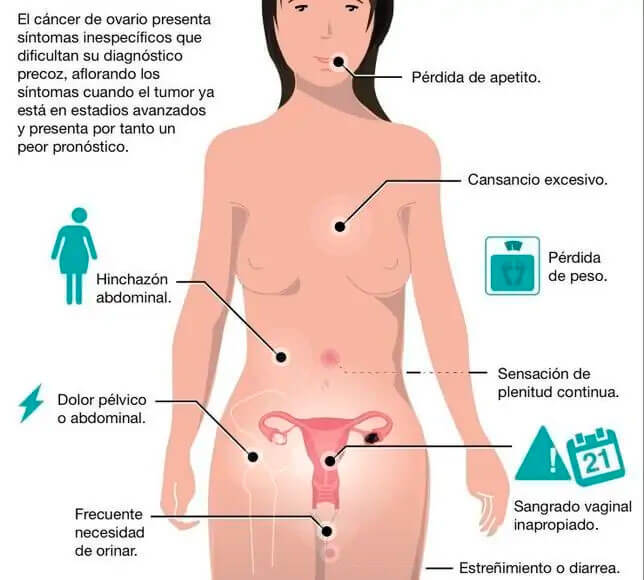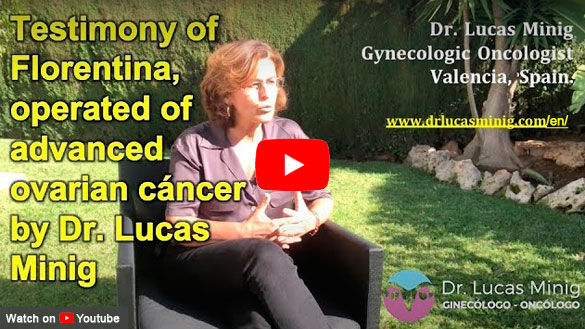
Treatment Options for Ovarian Cancer
What is ovarian cancer?
Cancer is a disease in which certain cells of the body grow out of control. Women have two ovaries situated in the pelvis, one on each side of the uterus. The main function of the ovaries is to produce and release the ovum for conception and produce female hormones (estrogen and progestin).
Request a quick appointment with the specialist in Ovarian Cancer, Dr. Lucas Minig, an expert Gynecologist Oncologist in this type of cancer that is very common in women.
Appointment: Click to Request an Appointment for ovarian cancer in Spain.
Contact: +34 679 112 179

It is a fast-growing tumor, so it is often diagnosed at an advanced stage, when the disease has spread across the abdominal and pelvic cavities, in almost 80% of cases.
Can ovarian cancer be detected early?
Answering the question about ovarian cancer, how is it detected? Today, there are no reliable tests for early detection of ovarian cancer before symptoms start.
It is important to remember that a pap smear is not useful for the early detection of ovarian cancer. Its utility is the detection of premalignant cervical lesions or cervical cancer in its early stages.
Nowadays there are multiple ongoing studies with the purpose of discovering new molecules in the blood useful for early diagnosis of the disease. This is of vital importance given that treatment effectiveness increases significantly when ovarian cancer is caught in its early stages, with the disease limited to the ovaries.
If you have doubts about how to detect ovarian cancer, contact our physicians, experts in ovarian cancer, or read our frequently asked questions about symptoms and ovarian cancer.
What are the risk factors for developing ovarian cancer?
Ovarian cancer usually presents around 60 years of age.
Even though it is difficult to find a specific cause for ovarian cancer, these are some of the main factors that can increase the risk of developing it:
Having one of the risk factors mentioned above does not mean the woman is going to suffer from ovarian cancer in the future, just that it is necessary to talk about it with your gynecologist.
What do I have to do to prevent ovarian cancer?
Even though there are no specific ways to prevent ovarian cancer, some of the following measures might help diminish the risk:
Ovarian cancer symptoms:
When ovarian cancer develops, it might not cause any notorious symptoms. When symptoms appear, they are often attributed to more common conditions.
What are the symptoms of ovarian cancer?
Women with cancer limited to the ovaries, are often asymptomatic and are diagnosed with a routine sonogram or physical examination. Nevertheless, ovarian cancer generally causes symptoms in women with advanced stages of the disease. Some of them are:
- Vaginal bleeding: particularly during menopause
- Pain or pressure in the abdominal or pelvic regions.
- Back pain.
- Bloating, which is the sensation of distention or “full stomach”.
- Feeling full with small or minimal food quantities.
- Changes in intestinal rhythm (diarrhea or constipation) or urinary symptoms (burning while peeing, increase in urinary frequency, and decrease in urine volume).

These symptoms are nonspecific, which means they can be caused by other conditions different from ovarian cancer. Nevertheless, it is very important for women to know that any change in symptoms mentioned above should prompt a visit to a doctor.
What procedures can help diagnose ovarian cancer?
Pelvic exam: it can alert about the presence of an ovarian cyst or nodules deep in the pelvis.
Ca 125: it is determined with a blood test. The level of this marker is often elevated in women with ovarian cancer in advanced stages. However, when the disease is limited to the ovary, the level of the marker can be normal.
Therefore, it is important to keep other clinical factors in mind. Also, Ca 125 is elevated in other types of tumors (uterus and digestive tract) or even low in physiological conditions such as menstruation, pregnancy, or stress.
Diagnosis and staging of the disease
- Gynecologic sonography: it determines the characteristics of the ovarian cyst, such as its size, presence of solid areas, or papillae.
- CT scan: it is performed routinely before any oncologic treatment to determine the extent of the disease outside of the affected organ: lymph nodes, abdominal or thoracic organs. It is typically performed with intravenous and oral contrast.
- Colonoscopy, gastroscopy: they are optional methods and are used only in selected cases.
- PET-CT: it is a method combining CT with the detection of a glucose-like substance previously injected into the body. Since tumoral cells can capture high quantities of glucose, suspicious lesions can be revealed by this method.
- Surgery: is the mandatory step to diagnose ovarian cancer. However, there are some exceptions in which an ultrasound-guided biopsy of an intraabdominal lesion can be performed to reach the diagnosis and decide the final treatment.
Request a Second Medical Opinion
Ovarian cancer treatment:
The initial treatment of ovarian cancer is the most important factor when determining the patient’s survival expectations. The surgical team must be adequately trained to perform the surgical treatment required by the patient.
The final decision of the best treatment for each case, in particular, is based on the following factors:
- The stage of the tumor.
- The extent of the disease.
- The desire for future fertility.
- The global health of the patient.
- The patient’s preferences.
Surgical treatment for ovarian cancer
Surgical treatment often represents the first step in treatment.
Surgical staging for ovarian tumors in early stages
Adequate surgical staging includes the following procedures:
- Hysterectomy: removal of the uterus including the cervix.
- Bilateral adnexectomy: this type of procedure follows the one described above and consists in the removal of both ovaries and fallopian tubes (adnexa of the uterus)
- Omentectomy: removal of fatty tissue linked to the large intestine.
- Pelvic and para-aortic lymphadenectomy: removal of lymph nodes in the pelvis and the ones surrounding the main arteries and veins.
- Appendectomy: removal of the appendix in selected cases of ovarian cancer (mucinous histologic variant)
- Multiple peritoneal biopsies: removal of small fragments (3-4 cm) in various regions (8-10) of the peritoneum. The latter is a thin tissue layer covering intra-abdominal organs and the abdominal wall.
We are committed to the development of innovative surgical techniques for the treatment of gynecologic cancer, including ovarian tumors in their early stages. To that effect, minimally invasive laparoscopic surgery represents the best example of technological development to ensure the best surgical results, minimizing postoperative complications.
Radical cytoreductive surgery for ovarian tumors in advanced stages
Chemotherapy
Chemotherapy is now administered intravenously but, according to the results of recent studies, it is probable that it will be administered orally in the next few years.
Today, almost 90% of patients with a diagnosis of ovarian cancer need chemotherapy either before or after surgery.
Nowadays, standard treatment consists in the administration of 6 carboplatin and paclitaxel cycles intravenously. Each cycle is separated from the next by 3 – 4 weeks.
Follow-up
The oncologic follow-up period starts after the initial treatment of the cancer. Its main goal is the early detection of a recurrence of the disease.
Beyond adopting the most effective follow-up norms, we also pay special attention and interest in maintaining and increasing the patient’s quality of life and achieving fast and effective reinsertion to daily life as it was before the cancer diagnosis.
Answering the question: is ovarian cancer curable? Most women in whom the tumor is limited to the ovaries achieve remission of the disease with surgery. In more than 7 out of 10 people with ovarian cancer, cancer recurs after treatment. When cancer recurs, a second surgery to remove as much cancer as possible can be performed, before restarting chemotherapy.
Frequently Asked Questions About Ovarian Cancer
Who develops ovarian cancer?
Any woman can develop ovarian cancer, but it is more likely in women between 65 and 84 years old. Ovarian cancer represents 10% of all types of cancer in women. Ovarian cancer is one of the most common causes of cancer death among women. Any woman can develop ovarian cancer.
How does an ovarian tumor hurt?
Pain from an ovarian tumor is often associated with abdominal or back pain. Pain or pressure in the pelvic area. bloated feeling Feeling full very quickly or difficulty eating.
What causes an ovarian tumor?
It’s not clear what causes ovarian cancer, although doctors have identified factors that may increase the risk of the disease.
Doctors know that ovarian cancer begins when cells in or near the ovaries develop changes (mutations) in their DNA.
What is the difference between a cyst and a tumor?
Tumors and cysts are two different entities.
- Cyst. A cyst is a sac that can be filled with air, fluid, or other material. A cyst can form anywhere in the body, including the bones, organs, and soft tissues. …
- Tumor. A tumor is any abnormal mass of tissue or swelling.
Opinions patients with Ovarian Cancer.
Doctor Lucas Minig Specialist in Ovarian Cancer in Valencia, Spain
Contact the Ovarian Cancer Specialist
Leave us your data and consultation to offer you personalized medical advice
International Consultation
If you want remote medical care, you can consult
through the following links:
International Appointment
Online Consultation
Whatsapp: + 34 679 112 179




